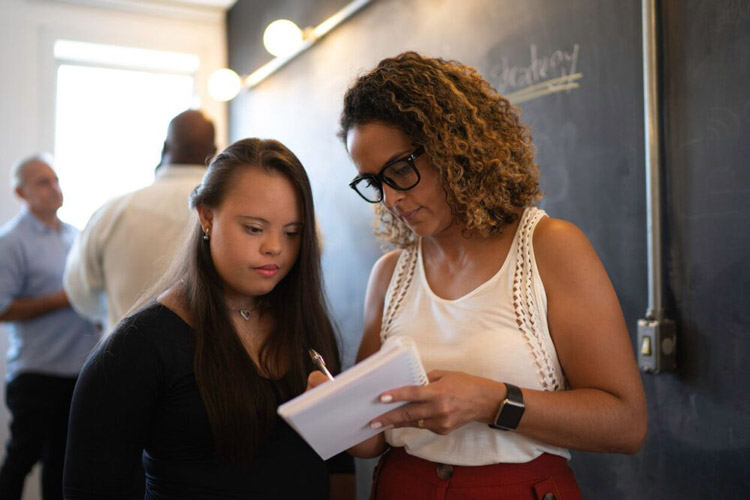Having a job you love can be an important part of living a full, meaningful life. But job-hunting, interviewing, and learning the ropes of a new job can be extremely stressful, whether you’re doing it for the first time or are an old pro.
For many, including people with developmental disabilities, a job coach can go a long way toward alleviating that stress and helping you succeed. Let’s look at how.
Finding the right career
Some people know exactly what they want to do. For others, it’s more of a process. And a job coach is a great resource to help you as you figure out what kind of work is best suited for you. If you’re interested in cars, a job coach can help connect you with a local mechanic so you can get a feel for that line of work. If you want to work with kids, a job coach can help you explore that. Or if you’re really just not sure, a job coach can also help you try out different opportunities until you find the right fit for you. And that can take into account a lot of variables; for instance, if you have sensory issues or don’t do well with loud noises, you and your job coach will work together to make sure you choose a work environment you can thrive in.
Landing the job
Discovering the career you want to pursue is a massive accomplishment—good job! But next, you’ll need to apply for the job, interview, remember to send a thank-you letter—there’s a lot that goes into the job-hunt. A job coach can help make sure you’re prepared for these tasks by showing you how to apply, practicing your interview questions, helping make sure you’re dressed appropriately, you have transportation, and more.
On the job
According to Cheryl Sasaki, AbleLight program manager of employment in Colorado, there’s some misunderstanding about what a job coach actually does when they’re on the job.
“Some people think we’re there to do the job,” she says. “But actually, our goal is to help our clients become independent in their roles so we can fade away.” In fact, Cheryl says, the goal is to have people reporting stability in their jobs—being comfortable with the tasks and able to perform them independently—within 90 days of starting.
“When we first start out, we’re with them full-time,” says Cheryl. “But after they achieve that stability, we might only see them one to two hours a week. Or we’ll just be available to help if they have questions or need support learning a new task.”
Providing job support can mean things like creating diagrams or prompts to help a person learn and remember their tasks. It also means helping the new employee do something Cheryl calls “building natural supports.” This includes getting to know the supervisors from different shifts to make sure the new employee always has a manager to go to with questions. And it means helping the new employee build relationships with coworkers who can support them as well, so even when the job coach isn’t there, they feel comfortable knowing they’ve got friends around them if they need help.
Outside of the job
There are also a lot of intangible ways working with a job coach can help enhance not just your working experience, but other areas of your life too. Being successful on the job builds confidence, says Cheryl, and that can make a big difference in how a person feels about themselves and how they present themselves in the world.
There are also other things you might learn through your job that you find useful outside of work. For instance, maybe you learn how to use public transportation or how to call an Uber so you can get to work—but you can also use that newfound knowledge to meet up with your friends on the weekend, run your own errands, and generally just be more independent.
“A lot of times, my clients will also start to understand money better,” says Cheryl. “They’ll learn when they get paid and how to budget for bills. And many will start saving for bigger goals, like getting an apartment or buying a car.”
Getting a job is about more than just punching a clock and earning a paycheck. It’s about finding meaningful work you love and enjoy. It’s about building confidence in yourself and your own abilities. And it’s about gaining independence on and off the job so you can live the full, meaningful life you deserve.

